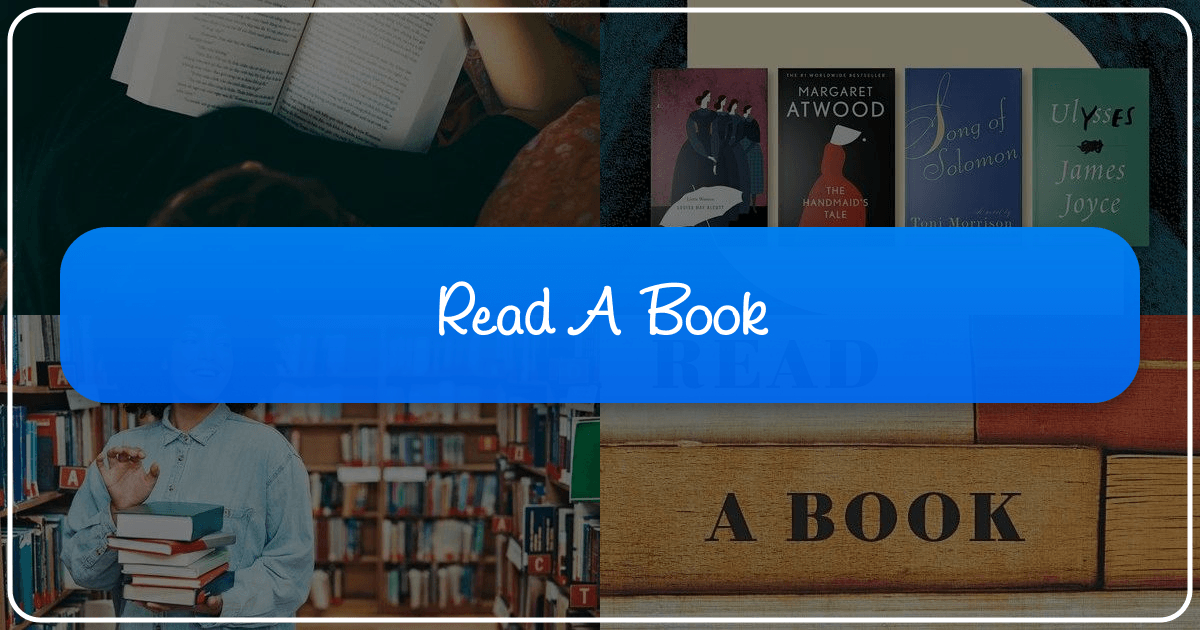Read a Book: Unlock a World of Knowledge and Personal Growth

Reading. A simple act, yet a profound journey. It’s the key to unlocking worlds beyond our own, expanding our understanding, and fostering personal growth. Whether you’re a seasoned bibliophile or a casual reader, the benefits of immersing yourself in the written word are undeniable. This article delves into the multifaceted world of reading, exploring its impact on personal development, the diverse formats available, and practical strategies to cultivate a consistent reading habit. We will also examine the broader cultural impact of books and their enduring relevance in our increasingly digital world.

The Allure of the Written Word: Why Read?
The simple act of picking up a book and losing yourself in its pages offers a multitude of benefits, enriching our lives in ways that extend far beyond simple entertainment. Reading invigorates the mind, sharpening cognitive abilities and fostering critical thinking. It’s a mental workout, exercising our ability to process information, analyze narratives, and form opinions. A captivating novel can transport us to distant lands, introduce us to fascinating characters, and allow us to experience life through different lenses, broadening our perspectives and fostering empathy.
Beyond the immediate pleasure derived from escaping into a compelling story, reading significantly contributes to personal growth. It expands our knowledge base, introducing us to new ideas, concepts, and fields of study. Whether it’s historical fiction that illuminates past events or a self-help book that provides practical tools for self-improvement, reading empowers us to learn and grow continuously.

The act of reading can also be profoundly calming and meditative. It offers a refuge from the constant bombardment of stimuli in our modern lives, providing a space for quiet reflection and introspection. Immersion in a good book can reduce stress, improve sleep quality, and enhance overall well-being. In essence, reading is a holistic activity that nurtures the mind, body, and soul.
But for many, the lament, “I don’t have time to read,” rings true. Yet, consider this: Many individuals can binge-watch entire television series in a matter of days. This highlights the fact that reading, like any skill, requires dedication and practice. It’s a commitment to personal development, a prioritization of knowledge acquisition.

Practical Strategies for Cultivating a Reading Habit
The key to becoming a more prolific reader lies not in grand gestures, but in implementing small, consistent changes to our daily routines. Lbibinders.org offers various strategies to help cultivate a consistent reading habit:
Making Time for Reading
The most significant hurdle to overcome is the perceived lack of time. However, if reading is a priority, finding the time becomes a matter of conscious effort. This involves prioritizing reading over less valuable activities, such as excessive social media scrolling or mindless television viewing. We all have 24 hours in a day; the difference lies in how we choose to utilize them.
Dedicated Reading Time: Scheduling regular reading time, even for short periods, can significantly increase your reading volume. Setting aside 20 minutes before bed, during your lunch break, or even while commuting can accumulate considerable reading time over a week. Consistency is key to establishing a habit.
Reading in Sprints: For those with shorter attention spans, the sprint method proves effective. Set a timer for 20-minute intervals and focus solely on reading. This helps to avoid burnout, allowing for short breaks in between to refresh and refocus.
Enhancing the Reading Experience
To make reading more enjoyable and engaging, consider these strategies:
Carry Your Books Everywhere: Always have a book (physical or digital) readily available. This allows you to capitalize on unexpected pockets of time – waiting at appointments, during commutes, or even during brief breaks at work.
Track Your Progress: Keeping a record of the books you read offers a strong sense of accomplishment and motivates further reading. Platforms like Goodreads provide convenient tools for tracking, reviewing, and sharing your reading journey.
Read Multiple Books Simultaneously: Reading multiple books at once caters to varying moods and interests. If one book fails to captivate, switching to another keeps your reading momentum alive.
Engage Actively with the Text: Mark up your books – underline key passages, highlight insightful quotes, and jot down personal reflections in the margins. Active engagement fosters deeper understanding and knowledge retention.
Share Your Reading: Discussing books with others – through book clubs or informal conversations – enhances your understanding and provides new perspectives. Teaching others about what you’ve read solidifies your knowledge and makes the experience more enriching.
Explore Different Formats: Experiment with audiobooks to optimize your reading time during commutes or other activities. Consider the advantages of ebooks for portability and accessibility.
Sourcing and Selecting Books
Finding books to read shouldn’t be a chore; rather, it should be a source of excitement and discovery:
Buy Inexpensively: Utilize online marketplaces like Amazon to purchase used or discounted books, allowing you to acquire more titles without exceeding your budget.
Stay Curious: Be open to discovering new books from various sources. Browse bookstores, libraries, and online forums for recommendations. Network with other readers to discover hidden gems.
Utilize Referral Sources: Seek out trusted reviewers or book recommendation services that align with your reading preferences. This can prevent wasted time on less engaging books.
Prioritize: Make reading a priority in your life. This requires conscious effort to allocate time and resources towards this enriching activity.
The Community Aspect of Reading
Reading isn’t a solitary pursuit; it’s a journey that connects us with others:
Join a Book Club: Participating in a book club, either online or in person, provides a social element, fostering discussions and shared experiences. Accountability and motivation are further benefits of group engagement.
The Different Forms of Reading
While traditional print books remain a cherished choice for many, the advent of digital technology has expanded our access to written material dramatically.
Print Books: The tangible experience of holding a book, turning the pages, and marking it up remains deeply satisfying for many readers. The tactile nature of a physical book enhances the reading experience for many individuals.
E-books: E-books offer unparalleled portability and convenience. They can be accessed virtually anywhere, making them ideal for commutes, travel, and downtime. E-readers often offer features like adjustable font sizes and built-in dictionaries.
Audiobooks: Listening to audiobooks provides another dimension to the reading experience. It allows for multitasking, making it possible to consume books while engaging in other activities like exercising or commuting.
The Cultural Significance of Reading
Books have played, and continue to play, a crucial role in shaping cultures and societies. They serve as powerful vehicles for transmitting knowledge, preserving history, and inspiring social change. The influence of literature extends to various aspects of culture:
Literary Influence: Great literary works shape our understanding of the world, influencing our perspectives, values, and beliefs. They challenge assumptions and inspire critical thinking.
Adaptations: Books often serve as the basis for films, television shows, and theatrical productions. These adaptations reach even wider audiences, further disseminating the power of storytelling.
Awards: Literary awards such as the Nobel Prize in Literature and the Pulitzer Prize recognize exceptional works of literature, acknowledging their cultural contribution.
Communities: Book-related communities, ranging from online book clubs to literary festivals, foster connections between readers, authors, and others who share a passion for the written word.
Is It Better for Kids to Read Print Books or E-books?
The question of whether print books or e-books are better for children is a matter of ongoing debate. Studies suggest that children may comprehend less when reading on screens, and that they may actually prefer paper books. Moreover, the tactile experience of a physical book can enhance engagement for younger readers. However, the accessibility and portability of e-books can be beneficial in various contexts. The optimal approach may involve a blend of both formats, balancing the advantages of each.
Conclusion: Embrace the Power of Reading
In an increasingly digital world, the importance of reading remains undiminished. It is a cornerstone of personal growth, intellectual stimulation, and cultural enrichment. By implementing practical strategies, engaging actively with the material, and embracing the diverse formats available, we can cultivate a consistent reading habit that enriches our lives in countless ways. So, pick up a book, immerse yourself in its pages, and unlock a world of knowledge and personal transformation.